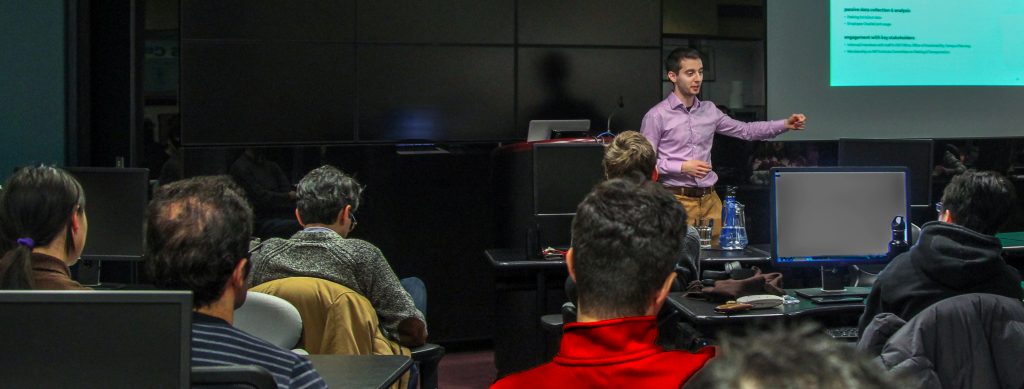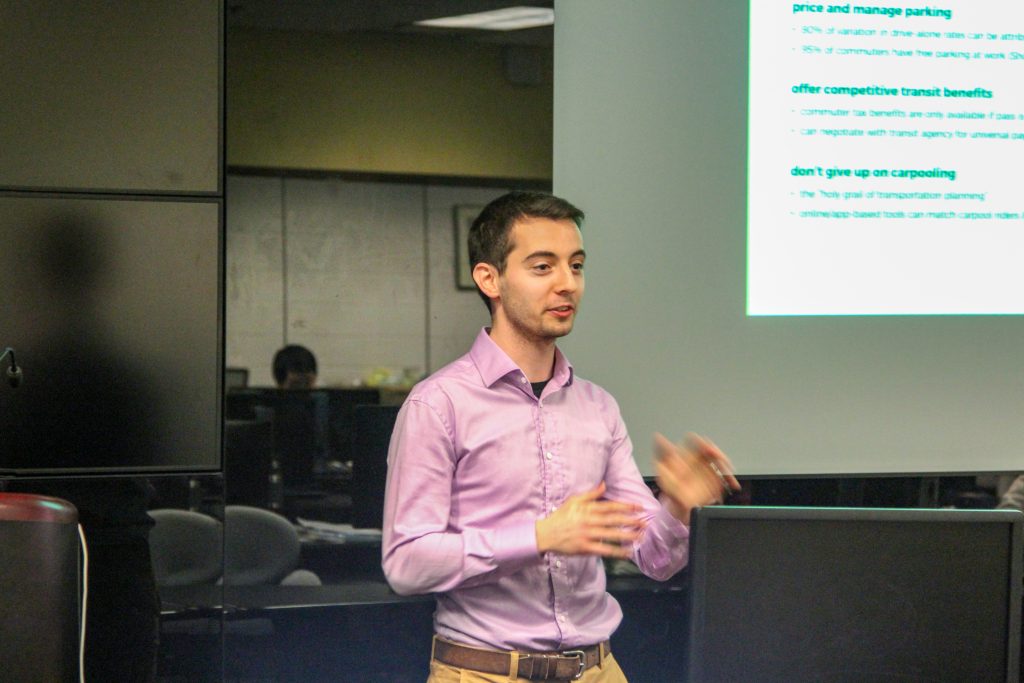
In his February 1, 2019 talk, “How MIT Got a Handle on Parking: The Behavioural Impact of Commuter Benefits,” Adam Rosenfield shared learnings from his graduate research at MIT investigating how employee benefits can impact commuter travel behaviour. Rosenfield spoke about a wide range of lessons learned while completing the project: about behavioural theory colliding with real-world institutional politics; the emotion of parking policy; and the inertia of the status quo in transportation planning.
Adam has a keen interest in the intersection of transportation policy, technology and human behaviour. In his talk, he said that understanding human behaviour can help shape travel behaviour and improve transportation policies, which can lead to more sustainable commuting. His research project at MIT focused on employee benefits and human behavioural science to encourage more sustainable modes of transportation and reduce parking demand.
In brief, Adam’s research project had three main objectives:
- to evaluate the impact of a set of reforms on faculty and staff at MIT in order to encourage alternate modes of commuting;
- to design experiments based on a randomized control trial to discover what other trials shift commuter travel behaviour more;
- to provide recommendations for policymakers.
Adam pointed out that building parking is costly, and therefore, MIT was motivated to make a change to reduce drive-alone mode share. MIT introduced a new plan, AccessMIT, to provide MIT with affordable, flexible and low-carbon mobility choices. AccessMIT has five key components:
- a switch from annual to daily parking fees, offering flexibility and alleviating sunk costs for multi-modal commuters;
- free transit passes for employees that commute to MIT;
- increased commuter rail monthly passes;
- subsidized parking at transit stations;
- online commuter dashboard with benefits and incentives for commuters.
AccessMIT was evaluated in three ways:
- through a survey every two years;
- with passive data collection – by looking at parking taps and transit usage;
- by engagement with key stakeholders about parking and transit policy.
Based on the evaluation results, there was an 8% reduction in parking demand in the first year. Transit ridership and the transit agency revenue increased. Drive-alone mode share declined from 30% in 2014 to 25% in 2016. In terms of cost, MIT is estimated to save $1.4 million annually after accounting for the averted capital costs of future parking garages.
Adam explained his research regarding “nudging” to further leverage existing policies. In his research, he conducted a six-week randomized control trial with 2000 employees who frequently parked on MIT campus. They were provided with information about MIT’s transportation benefits and monetary reward to participants. By analyzing trial results, Adam found that there was no statistically significant improvement. However, the post-experiment survey revealed a significant increase in awareness about MIT’s transportation benefits, and a larger mode shift from driving to transit compared to the information from revealed data.
These are just a few points from Adam’s presentation. For the full seminar, please see his presentation slides and/or a videorecording of his presentation.

Abstract
Employer benefits can play a key role in encouraging alternatives to drive-alone commuting. In 2016, the Massachusetts Institute of Technology (MIT) introduced a series of commuter benefits reforms for its ten thousand employees. Motivated by aging parking facilities and pressures for alternative land uses, as well as the Institute’s climate goals, MIT sought to reduce parking demand by ten percent by leveraging financial incentives and techniques of behavioral science. The program provided each employee with a fully subsidized local transit pass built into their MIT ID card, paid for by MIT on a per-use basis to the transit agency. For drivers, annual parking permits were replaced with daily, pay-as-you-park pricing to eliminate sunk costs and encourage day-to-day mode choice. Other elements included a transit station parking subsidy and online dashboard with incentives. Program impacts were monitored using a joint approach of employee surveys and automatic data collection across travel modes.

The result was an eight percent reduction in parking demand in the first year at a net annual savings to MIT of $140 per employee, after accounting for reduced future parking infrastructure expenditures. Transit agency revenue increased as ridership among MIT employees rose ten percent, and the single-occupant vehicle mode share declined from 30% to 25%. The program helped MIT manage the closure of a 372-space garage without denying parking to any employees, and will help accommodate future parking supply reductions. The program serves as a case study of how employer benefits can effect a mode shift away from drive-alone commuting in a cost-effective manner.

Adam Rosenfield is a transportation strategist with Autonomic, a subsidiary of Ford Smart Mobility, where he works on shaping the rollout of connected vehicles for the betterment of cities. He recently graduated from MIT with a dual master’s in city planning and transportation under the supervision of Professor Jinhua Zhao, where his research centred on the role of workplaces in transportation demand management. Adam is a University of Toronto transportation alumnus and holds a BASc in Engineering Science from the University of Toronto.
This seminar was presented by the University of Toronto Institute of Transportation Engineers (ITE) Student Chapter.
